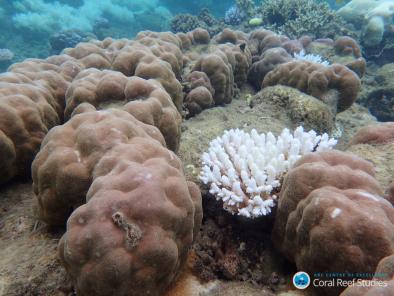Science Source
Mass coral mortality under local amplification of 2 °C ocean warming
- States that sea surface temperature in June 2015 in the South China Sea (SCS) increased by 2°C (in response to El Niño); reports that this amount was unlikely to cause widespread damage to coral reefs
- Adds that on the Dongsha Atoll, in the northern South China Sea, unusually weak winds created low-flow conditions that amplified the 2°C basin-scale anomaly
- States that water temperatures on the reef flat, normally indistinguishable from open-ocean SST, exceeded 6 °C above normal summertime levels and that mass coral bleaching quickly ensued, killing 40% of the resident coral community in an event unprecedented in at least the past 40 years
- Findings highlight the risks of 2 °C ocean warming to coral reef ecosystems when global and local processes align to drive intense heating, with devastating consequences
- Concludes that the extreme temperature (36 °C) reached in June 2015 was a result of global (El Niño warming superposed upon a global warming trend), regional (high pressure system and reduced winds), and local hydrodynamic (shallow reef, neap tide and unusually slow currents) factors aligning – at the right time – to drive intense heating
Related Content
Headline

Apr 18, 2018 | Washington Post
Global warming has changed the Great Barrier Reef ‘forever,’ scientists say
Science Source
| World Weather Attribution
Great Barrier Reef Bleaching, March 2016
Science Source
| Proceedings of the National Academy of Sciences
Ocean acidification affects coral growth by reducing skeletal density
Nathaniel R. Mollica, Weifu Guo, Anne L. Cohen et al
Science Source
| PLOS ONE
Coral physiology and microbiome dynamics under combined warming and ocean acidification
Andréa G. Grottoli, Paula Dalcin Martins, Michael J. Wilkins et al


